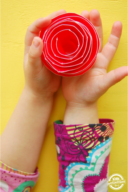Do you have a child who seems angry or aggressive, and are wondering what could be the real reasons your child is angry? Dealing with an angry child can be overwhelming, but odds are in your favor that your child is completely and totally normal, but getting to the root cause can save both you and your child a lot of heartache.

Angry Child
So your child is hitting?
Yelling?
Disagreeable?
Are these traits out of character for the sweet little kiddo you’ve been raising for a few years now?
Have you tried time-outs and taking away toys and limiting play dates? All to no avail.
Is Your Child Angry Beyond Temper Tantrums?
I remember what had to be the worst temper tantrum my daughter EVER had. She was 3, and I was trying to get both my girls ready to go out and celebrate at IHOP for my 1 year old’s birthday (her favorite food was pancakes).
I offered to fix my 3 year old’s hair first, but she wouldn’t quit playing, so instead…brace for the terrible thing I did…I began to fix my 1 year old’s hair. Screaming, hitting, flailing ensued. NOT the way I had wanted to celebrate a birthday.
It took me another year but I finally figured out what was causing my daughter so much anger (see #3 below) but the point is this…there was an underlying reason. She wasn’t a mean person or a bad person or really even an angry person.
And I had to remember that when my child is hard to love, that is when I should love her harder.
Good News About Angry Children
Odds are in your favor that you don’t truly have an angry or aggressive child. But the odds are also very good that one of these 6 things is going on with your child to make them feel angry or act out.
This post contains affiliate links.
Why Is My Child So Angry?
1. Your Child Is Overly Tired
You see this play out most when children are babies and toddlers and need naps and 13 hour sleep cycles at night. But do not underestimate the 7 year old who has stayed up too late for a few nights and gotten up for school each day for a week. She can be quite scary.
Children’s brains and bodies are developing so much that they don’t get the luxury of skimping on sleep for extended periods. And we seem to respect this theory when our kids are babies, but did you know that even your 10 year old needs between 10 and 11 hours a sleep at night? Don’t assume your child is truly angry until you know she’s getting enough rest.
Related: read here for sleep trick and tips for kids

2. Your Child Can’t Handle Their Emotions Or Express Them In Words
Do you ever get so angry that you can’t even think straight and you just want to hit something? Your child feels like that quite a bit. Even before the emotional roller coaster of puberty sets in, your young child is trying to learn how their tiny body can go from being happy to angry to excited to sad all in a matter of 10 minutes.

When my girls were young, we read “The Way I Feel” to help them understand and label their emotions. But also to let them know, these emotions were all normal.
3. There Is An Underlying Medical Condition
This is such a critical, but often missed, reason for aggression and anger in children. I wrote an entire post on how it impacted my own family and a friend of mine as well.
If your child seems angry and aggressive more often than what you think is “normal,” I encourage you to talk to your pediatrician about it. And don’t be surprised if it’s not an easy answer to find – or a quick one.
It took me years to figure out what was going on with my daughter and 3 years post-diagnosis, we are still trying to “fix” the issue. But knowledge is power – for both you AND your child.
When you find out the reasons your child is angry, you can begin to help them heal. And this is what our momma hearts really want (and they want it too).
4. Your Child Feels Powerless
“Sit here and be quiet.” “Get dressed and brush your teeth.” “We are having spaghetti for dinner.”
When you think about it, we certainly give our children a lot of directions but not often a lot of choice.

Partially this can be attributed to the fact that we are the parents, and kids just cannot dictate all of our choices because nothing (productive) would get done. But when you think about it, it is just EASIER to tell our kids what to do. This can be frustrating after a while when our children feel like they have no voice.
We try to give our girls as many opportunities as we can to make their own choices. Simple things really – They choose their own outfits each morning. They get input for our weekly meal plan, so their favorites get made pretty often.
Nothing major here, but it gives them a sense of control. And it can quickly help you figure out the real reasons your child is angry because they’ll trust you more.
5. Your Child’s Anger Is Displaced
Recently, my oldest daughter was acting out, getting angry with her sister, and talking back to me. It went on for about a week before I realized the root cause – there was a mean girl at school who had been making her dread even going to school.
Once we were able to address the real problem, she quit acting out at home. We didn’t immediately resolve the issue but she knew she wasn’t alone. It explained so much about what she was going through, and why she’d been behaving differently.
Childhood Anger: Your Child is Watching You and Your Reactions
This is a tough one Moms and Dads.
But take a moment and think about how you behave…
When things don’t go your way…someone cuts you off in traffic…you have a bad day at work…or when you haven’t had enough sleep.
Our children are watching us. They are learning the most from us. How we treat others. How we react when the stars don’t align just the way we imagined.
And yes, being angry is OKAY. Let them see you angry. It’s a normal emotion. But take a moment before you act on that emotion.Because you might just see that same reaction in your child next week.
At the end of the day, most of us will agree that our children are not angry little humans…we just need to step back, gain some perspective, and uncover the real reasons for their anger so we can address it properly.

How Do You Discipline an Angry Child?
As you figure out the real reasons your child is angry, you are probably left with the questions:
- How do you discipline them?
- Do you discipline them?
Discipline looks different when you are dealing with anger issues. Your child doesn’t need for you to get angry at them when they are struggling to control their emotions. What they need is to be validated and taught how to take that energy and process it in a constructive way.

Tips for Disciplining Angry Children
1. Stay Calm
Be sure that you approach them with a calm demeanor. They feel our energy toward them and if we are angry, that will only escalate the situation.
Help calm them down by reminding them that being angry is okay, but acting mean or aggressive in their anger is not okay. Help them understand that while they can “feel” the emotion, you are going to help them come up with other ways to calm themselves.
2. Provide Anger Alternative
Give them some self-soothing techniques. Perhaps they would benefit from a squishy ball (these can work wonders) or drawing what is making them angry.
3. When Needed, Seek Help
If all else fails, seek outside help.
While it may take some time to understand the real reasons your child is angry; don’t give up in the process. Your child needs you now more than ever and you will see light at the end of the tunnel. By being an example to your children, loving them, and trying, you are showing them that they are not alone.
angry kids faqs
While anger is a normal reaction in children of any age, there are warning signs that can signal that your child is not handling anger well:
1. Their anger in reaction to a situation is excessive for their age or developmental stage.
2. They can’t control their anger even when prompted and given time to cool off.
3. Their peer group is pulling away because of their angry reactions.
4. They consistently don’t take responsibility for their own actions and blame others.
5. Your child’s anger turns into harm for themselves or others.
We tackled many of the ways to parent an angry child in this article, but it really comes down to several big issues:
1. Be a good role model.
2. Address coping skills during calm times.
3. Work with your child to create new ways to cope and react to anger.
4. Support an angry child who is trying to work through it and realize that it doesn’t always look like progress in the middle of a blow up!
5. Love your child and reward the calm times.
While a tendency to anger can run genetically through families, it is more common explanation that excessive anger reactions are a learned behavior within families.

More Real Parenting Advice from Real Moms
- How to stop whining in kids
- When Your Kids Misbehave in Public
- Finding Rest as a Mom
- If Your Toddler is Playing Too Rough
- No…Disciplining Kids Isn’t Fun
- How to Teach Kids Empathy
Leave a comment: How do you work through your child’s anger?

























0